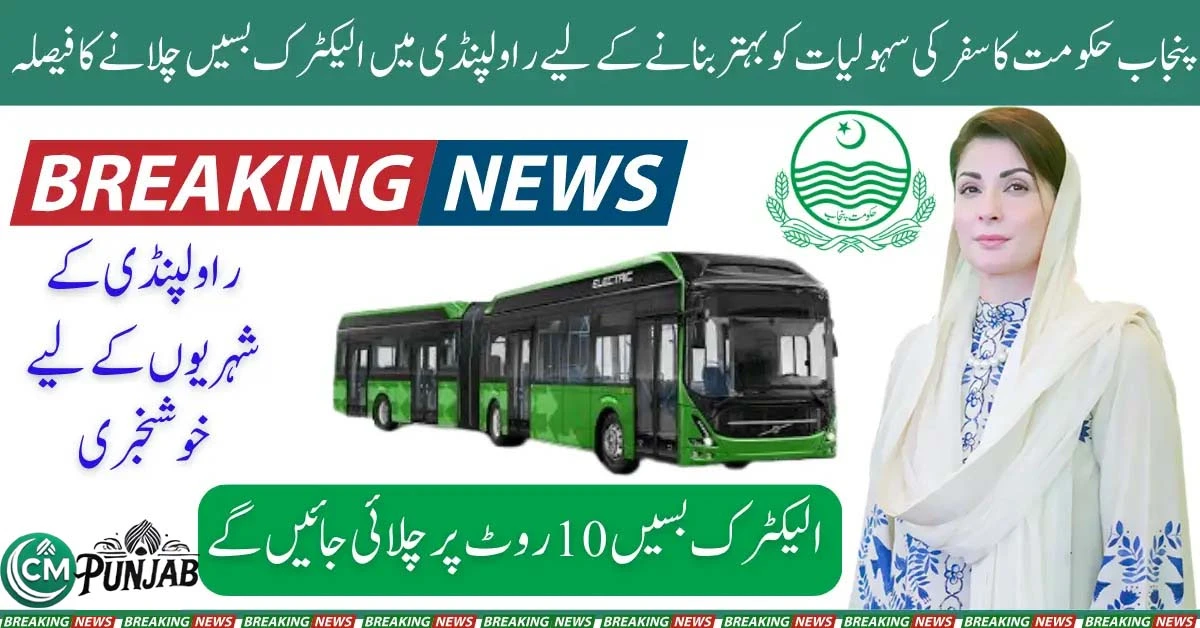Efforts to reduce air pollution and modernize public transport in Rawalpindi are taking a giant leap forward with the introduction of electric buses. This groundbreaking initiative aims to enhance the commuting experience while addressing environmental concerns, marking a significant milestone for sustainable urban development in the region.
What Makes Electric Buses a Game-Changer?
Electric buses are a sustainable and eco-friendly alternative to traditional diesel and petrol-powered vehicles. Unlike conventional buses, electric buses produce zero tailpipe emissions, helping to combat urban air pollution—a pressing issue in bustling cities like Rawalpindi. This switch is expected to transform the public transport landscape, offering residents a cleaner, quieter, and more efficient way to travel.
How Many Electric Buses Will Be Deployed?
The project plans to introduce 102 electric buses to Rawalpindi’s streets. These state-of-the-art vehicles will operate across major routes, providing reliable transportation for thousands of daily commuters. Additionally, new bus terminals will be constructed to support this transition, equipped with modern amenities such as:
- Well-maintained waiting areas.
- Adequate lighting and security features.
- Proper waste disposal systems.
These measures aim to create a comfortable and clean environment for passengers, setting a new standard for public transport in the city.
Cleaner Public Transport for Rawalpindi
One of the primary goals of this initiative is to tackle the long-standing issues of overcrowding, waste management, and pollution in Rawalpindi’s public transport system. Electric buses are seen as a solution to these problems. Their introduction will:
- Reduce harmful emissions, improving air quality.
- Offer a quieter and smoother travel experience.
- Promote cleanliness by incorporating proper waste disposal facilities at terminals.
By adopting these measures, Rawalpindi is taking a proactive step towards creating a healthier and more sustainable urban environment.
Also Read: Electric Bike Registration Online: Step-by-Step Guide by Maryam Nawaz for 2025
Advantages of Electric Buses
Electric buses come with a host of benefits that make them a preferred choice for modern cities:
- Zero Emissions: Electric buses run on battery power, eliminating harmful pollutants from the air.
- Cost Efficiency: While the initial investment is significant, electric buses have lower operating and maintenance costs compared to diesel or petrol vehicles.
- Improved Passenger Comfort: These buses are quieter and offer smoother rides, making daily commutes more enjoyable.
- Reduced Congestion: With efficient scheduling and reliable performance, electric buses are expected to ease traffic congestion.
- Long-Term Sustainability: Electric buses support the broader goals of reducing carbon footprints and transitioning to greener urban mobility systems.
A Vision for a Sustainable Future
Rawalpindi’s electric bus project is more than just an upgrade to public transport—it is a step toward a sustainable future. By reducing reliance on fossil fuels and promoting eco-friendly transportation, the city is setting an example for other urban centers in Pakistan. Furthermore, the project encourages community participation, urging citizens to maintain cleanliness and adopt environmentally responsible habits.
What Does the Electric Bus Project Cost?
The total estimated cost of the electric bus project is 7 billion PKR, with the Punjab government allocating 4.7 billion PKR to kickstart the initiative. The project will span 84 kilometers, covering major transport routes in the city. This investment underscores the government’s commitment to modernizing infrastructure and improving the quality of life for residents.
Conclusion
The introduction of electric buses in Rawalpindi is a transformative move that promises to address key issues such as air pollution, inefficiency, and public transport challenges. By embracing clean technology and sustainable practices, the city is paving the way for a greener, more efficient future.
Electric buses are not just vehicles—they represent a commitment to progress, innovation, and environmental responsibility. As Rawalpindi transitions to this modern transport solution, the benefits will ripple through the city’s economy, environment, and public health.
FAQs
1. When will the electric bus project be completed?
The project is expected to be completed by November 2025.
2. How many routes will the electric buses cover?
The buses will operate across 10 routes, covering a total of 84 kilometers in Rawalpindi.
3. What are the key benefits of electric buses?
Electric buses offer zero emissions, cost efficiency, improved passenger comfort, and reduced congestion, contributing to a sustainable urban environment.
4. Who is funding the electric bus project?
The project is primarily funded by the Punjab government, with an initial allocation of 4.7 billion PKR.
5. How can citizens contribute to the success of this initiative?
Citizens can support the project by maintaining cleanliness in public transport spaces, disposing of waste responsibly, and adopting eco-friendly habits.


As salam o Aalaykum
My Name is Muhammad Usman Khan
I want grommet job plz help me